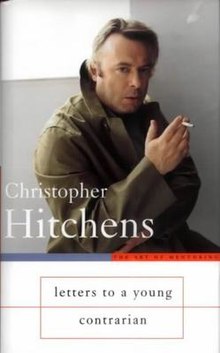
Christopher Hitchens (d. 2011) was a public intellectual known for his outspoken views on religion and politics and his often confrontational means of communication. His circle of influence included presidents, dissidents, revolutionaries, and academics alike, and he authored 30 books that continue to inspire and challenge people around the world. Letters to a Young Contrarian is primarily concerned with showing how to be a “contrarian,” that is, someone who intentionally and rigorously challenges the status quo. This is something that Hitchens himself made a career out of. Readers will enjoy seeing the contrarian methodology applied across the broad array of subjects this book addresses, including politics, economics, and religion.
Hitchens was a polymath, and wielded the English language skillfully, parrying and thrusting at the stagnant attitudes of modernity with elegance. The result is a book full of obscure terms and references with little explanation, but any effort given to understanding Hitchens’ arguments will be richly rewarded. However, some may find his narcissistic tone off-putting.
Letters to a Young Contrarian poses as a collection of letters between Hitchens the sage and an aspiring mentee who wants to make a change in the world. As a left-leaning humanist, Hitchens draws attention to flaws in religion, society, politics, and nationalism and calls readers to embrace the role of misfit in order to create a better tomorrow. The book is valuable for these critiques, and Hitchens does a good job of calling awareness to cognitive dissonance that many readers experience subconsciously, but have not felt permission to address head on.
That being said, when Hitchens addresses a topic I know something about (religion), I find his critiques are valid against popular ideology, but do little to strike at the deeply rooted heritage of the traditions he opposes. For example, he rightly calls the notion of heaven as a "state of endless praise and gratitude and adoration" a "vision of tedium and pointlessness and predictability" (25). But Hitchens seems unaware that these beliefs are best categorized, shelved, and forgotten as pop theology and have little to do with the rich theological tradition which emphasizes the future state of humanity as a new creation—Earth renewed, with work, play, and relationships providing meaningful pursuits (cf. the work of N.T. Wright).
In another place, Hitchens critiques religion for claiming to know what the Supreme Being desires. He argues that they assume the conclusion from the beginning, while begging the question himself regarding the impossibility of divine revelation (57). It seems fair to state that both believer and skeptic stand on equal footing in this regard. If the divine exists, it seems right to assume divine self-revelation. When Hitchens states that divine revelation "degrades the whole concept of the free intelligence" of humanity, one wishes that he was familiar with Bonhoeffer’s theology of “the world come of age.” For Bonhoeffer, revelation is the preliminary guide for human intelligence, much as parental rules provide guidelines during early childhood development. Rather than degrading human intelligence, revelation provides the nurturing environment for it to flourish until it develops its full capacity.
Letters to a Young Contrarian concludes with a vision of the next epoch of human history, an era when the concept of universal human rights is realized, and when the globalization of production is matched by the globalization “of a common standard for justice and ethics.” Those familiar with the work of theologian Jurgen Moltmann will see clear parallels. But where Hitchens focuses on the result (a better future), Moltmann names the impetus for change as the Divine drawing humanity towards the Divine Self. Hitchens would do well to heed his own advice to avoid "the narcissism of the small difference" (59), and instead, work together with likeminded people, even people of faith, to advance "the immense discoveries about our own nature" that remain to be found (108).
Criticisms aside, Letters to a Young Contrarian is a refreshing, witty, thought-provoking book that should be on the reading list of every free thinker.
 RSS Feed
RSS Feed
